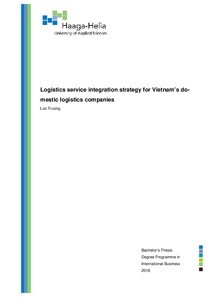Logistics service integration strategy for Vietnam's domestic logistics companies
Truong, Loc (2019)
Truong, Loc
2019
All rights reserved. This publication is copyrighted. You may download, display and print it for Your own personal use. Commercial use is prohibited.
Julkaisun pysyvä osoite on
https://urn.fi/URN:NBN:fi:amk-2019060615349
https://urn.fi/URN:NBN:fi:amk-2019060615349
Tiivistelmä
This study aims to analyse the current state of a majority of local Vietnamese logistics companies and to illustrate why it is essential for them to integrate more logistics services and transform into 3PL, 4PL, and 5PL to meet with the country’s and region’s logistics demands. With this objective, the researcher explored relevant concepts and theories related to logistics services integration. The fundamental concepts of 3PL, 4PL, 5PL were discussed along with providing a comparison between them.
Empirical evidence related to the factors affecting the selection and the performance of logistics services providers was collected. To achieve the research objective, the researcher also conducted qualitative analyses, and data was collected from in-depth interviews with five experts. The interviews revealed vital problems and challenges in Vietnamese logistics services providers, including lengthy customs clearances, low infrastructure quality, and high corruption in governmental bodies. In addition, human resource quality, lack of experienced and professional staff, obsolete IT systems, and poor logistics services development strategies were identified as limiting competitive advantages of domestic logistics services providers.
Finally, some strategies were proposed to further improve the performance and competitive advantage of logistics companies in Vietnam. Throughout this study, the researcher brought in support from literature on logistics services as well as an evaluation of the current state of logistics services in Vietnam. In-depth interviews were used to identify the issues further and proposed practical solutions to logistics companies. This is critically important since most logistics companies are operating as small businesses and they mostly focus on 2PL logistics services, with only a few companies that can deliver 3PL or 4PL logistics.
Empirical evidence related to the factors affecting the selection and the performance of logistics services providers was collected. To achieve the research objective, the researcher also conducted qualitative analyses, and data was collected from in-depth interviews with five experts. The interviews revealed vital problems and challenges in Vietnamese logistics services providers, including lengthy customs clearances, low infrastructure quality, and high corruption in governmental bodies. In addition, human resource quality, lack of experienced and professional staff, obsolete IT systems, and poor logistics services development strategies were identified as limiting competitive advantages of domestic logistics services providers.
Finally, some strategies were proposed to further improve the performance and competitive advantage of logistics companies in Vietnam. Throughout this study, the researcher brought in support from literature on logistics services as well as an evaluation of the current state of logistics services in Vietnam. In-depth interviews were used to identify the issues further and proposed practical solutions to logistics companies. This is critically important since most logistics companies are operating as small businesses and they mostly focus on 2PL logistics services, with only a few companies that can deliver 3PL or 4PL logistics.
